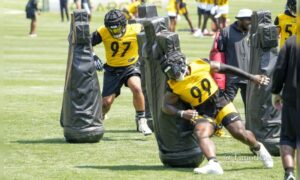The offensive game plan has certainly undergone some changes, not to mention personnel, since the Pittsburgh Steelers got off to a woeful 0-4 start of the season a year ago.
Offensive coordinator Todd Haley was forced to adapt, improvise, and make concessions just to help the team start climbing out of the hole that they dug for themselves. Many of those adaptations worked, and by the end of the season, it’s probably fair to say that it was the offense doing the majority of the legwork during the team’s 6-2 push in the second half of the year.
Many of these tweaks and adjustments have been frequently discussed, such as the usage of the no huddle, but one of the more intriguing story lines entering this season, to me, is how much the Steelers continue one other adjustment from a year ago into this year.
After Mike Adams was benched at left tackle, the coaching staff put Kelvin Beachum into the starting lineup at the same position. He had some struggles of his own early on, but as the games went by, he gradually became more comfortable, and more successful.
The fact is that there was another coincidental event taking place at the same time as Beachum’s newfound success in pass protection, and that was the usage of quicker, more decisive reads and passes.
Quarterback Ben Roethlisberger was going through his progressions faster, making quicker decisions, and showing greater willingness than ever to check the ball down rather than risk getting sacked.
The shorter blocking time helped the entire offensive line, and the sack totals dropped dramatically in the second half of the season. Though it was seemingly somewhat against his nature, Roethlisberger began to thrive with a quicker passing approach. Would that carry over into next season, or was it just a bandage for a creaky offensive line?
Mark Kaboly asked Ramon Foster earlier this offseason if the Steelers were looking to get back to letting Ben be Ben back there, scrambling around, tossing defenders and making plays with his size and strength.
He didn’t really give much of a clear answer one way or another as to whether or not the quicker passes are here to stay, out the window, or just quietly folded into the rest of the offense, but he did talk about what it’s like blocking for a quarterback like Roethlisberger.
Me coming into the league, my first start was next to Justin Hartwig and Willie Colon, and Willie told me, and Justin said, ‘when you’re blocking for Ben, you might have to block a little bit longer. When you think you’ve blocked long enough, block longer’, because, you know, he’s going to hold the ball. And that’s always been my mentality as far as blocking for him, so I take pride in that. Ben makes plays when he does stuff like that, so I can’t knock it or say he should get rid of the ball or anything like that. If he has a great playing sense the way he does, and he can make plays with it, I’m all for it. As an offensive lineman, you just don’t want to be the guy that gives up the sack if that situation does occur.
In other words, even if the play calls for a quick pass, the linemen should know better by now than to assume that the ball is actually going to be out of the quarterback’s hands when it’s supposed to be.
If Roethlisberger senses that the play isn’t there, or that a bigger one can be had, he’s liable to pull that ball back, stiff arm a linebacker or two, and make that heave down the field. Nobody on that line knows better than the veteran Foster that you don’t want to be the one getting him sacked in those situations, regardless of how the play was drawn up in the huddle.







